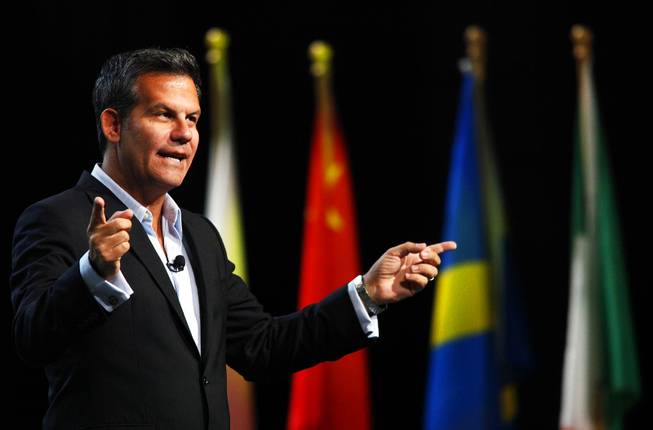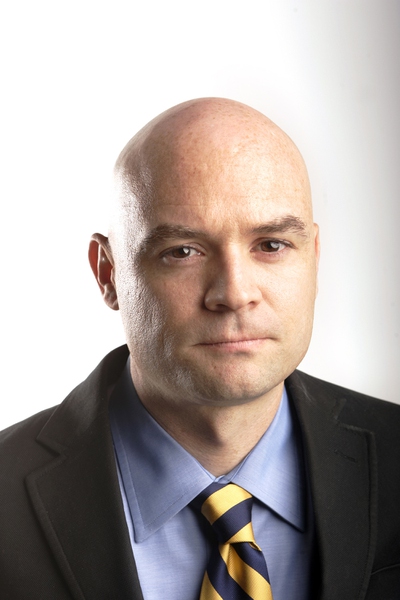
Richard Florida, author, professor and senior editor at The Atlantic, speaks during Preview Las Vegas 2012 at the Cox Pavilion in Las Vegas Thursday, Feb. 9, 2012.
Friday, Feb. 10, 2012 | 2 a.m.
Record-breaking tourism predicted this year
KSNV coverage of Preview 2012 and the Las Vegas Convention and Visitors Authority showing statistics and making optimistic predictions for this year, Feb. 9, 2012.
Sun archives
Related story
I’m generally skeptical of and resistant to pom-pom boosterism. So at the Chamber of Commerce’s Preview Las Vegas 2012 on Thursday, I snickered some at the optimism and good cheer, half expecting Gen. Westmoreland or Donald Rumsfeld to emerge and tell us they see the light at the end of the tunnel.
In truth, though, it feels like the worst of the Great Recession is over, even in Southern Nevada. Rossi Ralenkotter, CEO of the Las Vegas Convention and Visitors Authority, and Jeremy Aguero of the firm Applied Analysis gave upbeat presentations with data showing things are looking up: Visitation is up for 22 consecutive months; room rates are up 25 percent since hitting bottom; population, employment, incomes are all up slightly.
And although the suffering of the hungry, foreclosed and underwater homeowners goes on, we may be seeing — barely visible, like spring tulips fighting to get out of the ground after a brutal winter — a period of creativity and innovation both in our core industry of tourism and the broader economy.
Robert Lang, director of Brookings Mountain West, imagined the Las Vegas of 2030, looking back at key developments that created a broadly shared and sustainable prosperity: an interstate to Phoenix and rail to Southern California, a link to the electricity grid that allows us to sell solar power to California, improved health care via a UCLA medical school in Las Vegas, technology clusters south of the airport and downtown.
We’ll see.
The featured speaker, Richard Florida, director of the Martin Prosperity Institute at the University of Toronto and author of “The Rise of the Creative Class,” encouraged us to build a city that nurtures the creativity of its citizens, which he says is what drives wealth creation these days. We can attract and retain creative people by improving our quality of life, working on basics like good schools and low crime, welcoming diversity, and nurturing the arts and parks and so on.
Creativity can be found among artists, of course, but he also pointed to technology workers, scientists and even hotel workers, who can use their cognitive or emotional intelligence to improve the guest experience. (Here’s a previous column on Florida.)
Florida said his new passion is applying his theories to service industries, which employ 60 million workers nationwide and several hundred thousand in Nevada. Economists say Americans without college degrees or specialized skills could once rely on high-wage manufacturing jobs — or in our case, construction jobs — but are now often stuck in low-wage service jobs, if they find work at all.
Florida said he wants to make service sector jobs what manufacturing jobs once were — like the one his father had in a New Jersey factory that allowed him buy a home and put his children through Catholic school and state college.
How to do this?
Florida said even workers without college degrees can bring creativity to a job, which will in turn make their companies more productive. So, just as smart factory workers can make the manufacturing process more efficient or improve quality control, so, too, can workers in a retail store or a hotel, or so the theory goes.
I’m skeptical that if a big retail giant wins new profits with the help of its more productive workers it will share those profits with workers over whom it has total control. To some degree, we already know how to strengthen living standards for service workers in Las Vegas because we’ve done it. Our room attendants make 30 percent more than the national average. On top of that, they have excellent health benefits. Why? Because we have a powerful labor union, the Culinary Local 226.
The union has given leverage to people such as hotel room attendants — who could shut down the Strip on a moment’s notice — when otherwise they would have none.
So there’s that, too.


Join the Discussion:
Check this out for a full explanation of our conversion to the LiveFyre commenting system and instructions on how to sign up for an account.
Full comments policy